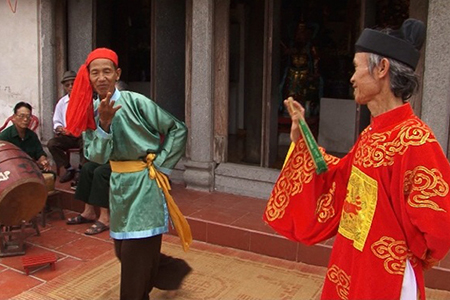Khuoc is one of the three famous cheo villages in Thai Binh Province. In turn, Thai Binh is one of Vietnam's cheo cradles. No one knows the exact origins of Khuoc cheo: villagers say they have performed since ancient times. At the peak of its theatrical development, the village had eight cheo groups. Some Khuoc performers such as Pham Van Dien, Dao Thi Na. Ha Quang Bong, and Cao Kim Trach have become household names. Khuoc Village supplies talented artists to the Viet Nam Cheo Theatre Company as well as cheo theatres in other provinces. Khuoc cheo is unique: cheo artists from Ha Tay, Hung Yen, Ha Nam, and Hai Duong journey to Khuoc Village for training.
Khuoc villagers have staged many cheo plays they themselves wrote. One of them, The Orange Orchard (Vuon cam, 1958) marked the height of success for Khuoc cheo. Other famous plays are An Homeland Plough (Chiec cay cai tien, 1965), The Homeland of Rice and Humanity (Que lua tinh nguoi, 1972), The Mother's Joy (Niem vui cua me, 1988), and Two Companions (Doi ban dong hanh, 1990). Meanwhile, the village continues to rehearse and perform classical plays, such as Luu Binh and Duong Le. Truong Vien, and Thi Kinh, the Goddess of Mercy.

The village has many activities to preserve its cheo tradition, including an active cheo club. Club members are all ages. One member Khoa, shone with pride, saying, "Our club wins gold medals in all the cheo festivals and competitions we enter." In many families, three or even four generations perform together. The old pass down cheo skills to the young. Every day, Mr. Cao Kim Trach age ninety-five, trains young artists how to sing cheo lyrics. Cheo actors as young as thirteen have won gold and silver medals in cheo contests.
Khuoc villagers have captured their love for cheo in their following song:
Having had a good meal, I lie idle
But as soon as I hear the sounds of cheo drums,
I tap my belly and set off to watch the performance.
Turning down high-class pork pies and spring rolls,
I just want to eat simple rice and watch popular Cheo.



